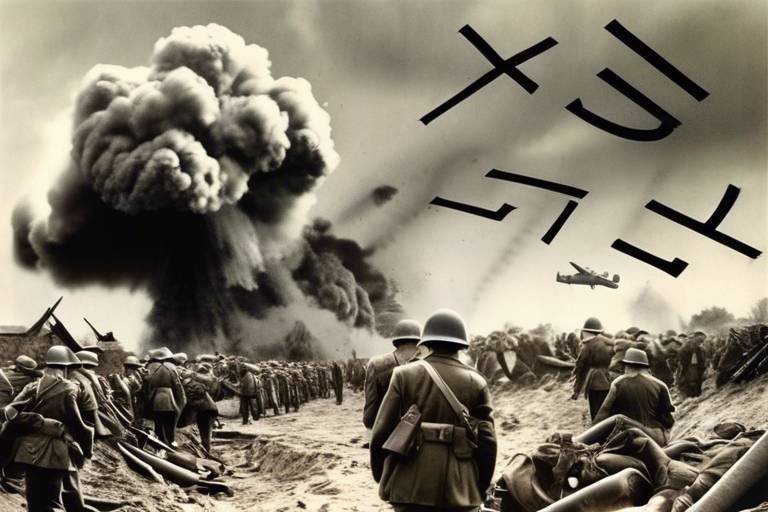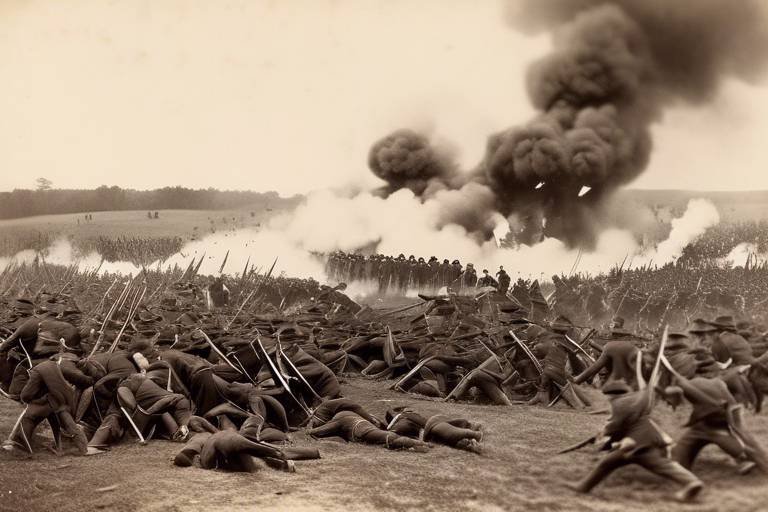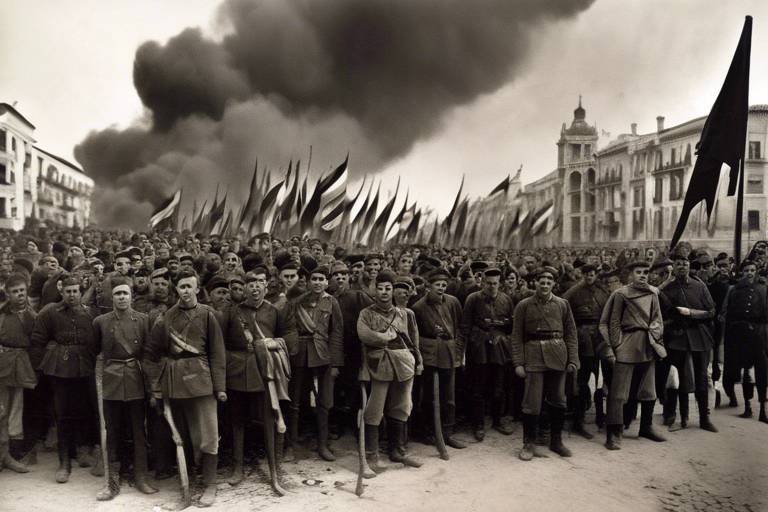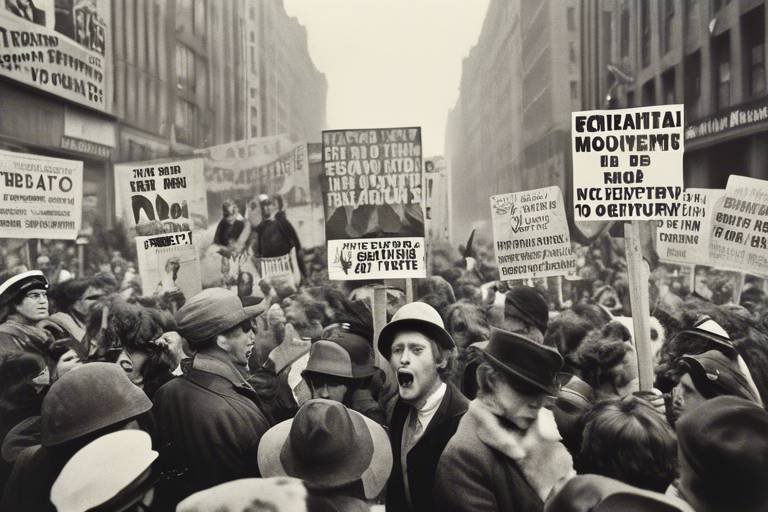The Role of Political Alliances in World History
Political alliances have played a pivotal role in shaping the course of world history, acting as both catalysts for cooperation and triggers for conflict among nations. These strategic partnerships have been instrumental in determining the outcomes of wars, influencing global power dynamics, and fostering diplomatic relations between countries.
Throughout history, political alliances have been a common practice among nations seeking to achieve common goals, whether it be for mutual defense, economic cooperation, or territorial expansion. These alliances have ranged from ancient civilizations to modern superpowers, each with its own set of motivations and consequences.
In ancient times, political alliances were crucial for the survival and expansion of empires such as the Greeks, Romans, and Egyptians. These alliances often determined the outcomes of battles and wars, shaping the geopolitical landscape of the ancient world.
During the medieval and Renaissance periods, feudal alliances and treaties between kingdoms and city-states were prevalent, leading to shifting allegiances and power struggles across Europe. The formation of alliances during this time laid the groundwork for the emergence of modern nation-states.
The colonial era witnessed the formation of alliances between European powers as they vied for control over overseas territories. These alliances often resulted in conflicts and wars as nations competed for dominance in the global arena.
The world wars of the 20th century were marked by intricate webs of alliances that ultimately led to devastating conflicts on a global scale. The alliances formed prior to World War I and II had far-reaching consequences, reshaping the political landscape and redrawing national borders.
The Cold War era saw the formation of political alliances between the Western bloc, led by the United States, and the Eastern bloc, led by the Soviet Union. This ideological divide resulted in a tense standoff between superpowers and their allies, shaping global politics for decades.
In the modern era of globalization, political alliances have taken on new forms with the establishment of organizations such as NATO and the European Union. These alliances aim to promote peace, security, and economic cooperation in an increasingly interconnected world.
Despite their benefits, political alliances also face challenges and pitfalls, including conflicting interests, power struggles, and the erosion of national sovereignty. The complexities of navigating alliances in a rapidly changing world require careful diplomacy and strategic decision-making.
Looking ahead, the future of political alliances remains uncertain as emerging powers, shifting alliances, and technological advancements continue to reshape the global landscape. The role of alliances in maintaining peace and stability in an ever-evolving world will be crucial in addressing complex geopolitical challenges.

Definition of Political Alliances
Political alliances have played a crucial role in shaping the course of history, influencing the relationships between nations and the direction of global politics. From ancient civilizations to modern-day superpowers, alliances have been both the architects of peace and the harbingers of conflict.
Political alliances can be defined as agreements or partnerships between nations or political entities to achieve common goals, whether it be economic, military, or diplomatic. These alliances are formed based on mutual interests and the need for collective security or advancement in the international arena.
Throughout history, political alliances have been instrumental in maintaining the balance of power, fostering cooperation between nations, and deterring potential adversaries. They can range from formal treaties and military pacts to informal agreements and diplomatic understandings.
At their core, political alliances are a reflection of the complex web of relationships that govern international politics, where states navigate a delicate dance of cooperation and competition to secure their interests and influence the global order.
By joining forces through alliances, nations can amplify their strengths, share resources, and bolster their position on the world stage. However, these alliances also come with their own set of challenges, as conflicting interests, power dynamics, and shifting geopolitical landscapes can strain even the strongest partnerships.
Ultimately, the definition of political alliances goes beyond mere agreements between nations; it embodies the intricate tapestry of alliances, rivalries, and negotiations that define the ever-evolving landscape of international relations.

Ancient Political Alliances
Ancient political alliances played a crucial role in shaping the course of history, laying the foundation for the complex diplomatic relationships we see today. In ancient civilizations such as the Greeks, Romans, and Egyptians, alliances were forged out of necessity, ambition, and sometimes survival. These alliances were not just mere agreements but strategic partnerships that dictated the balance of power in the ancient world.
For example, the Greeks formed alliances known as "symmachy" to defend against common enemies or assert dominance in the region. The most famous of these alliances was the Delian League, led by Athens, which aimed to counter the threat posed by the Persian Empire. Similarly, the Roman Republic relied on alliances with neighboring city-states and tribes to expand its influence and control over the Mediterranean.
Moreover, the Egyptians, under the rule of pharaohs, often formed alliances with other kingdoms to secure trade routes, access valuable resources, or strengthen military capabilities. These alliances were not just political arrangements but also cultural exchanges that influenced art, architecture, and religious beliefs.
However, ancient political alliances were not without their challenges. Betrayals, shifting loyalties, and power struggles were common, leading to conflicts that reshaped the political landscape. The intricate web of alliances in the ancient world mirrored the complexities of modern-day diplomacy, showing that the dynamics of power and cooperation have deep roots in history.

Medieval and Renaissance Alliances
The Medieval and Renaissance periods were characterized by intricate political alliances that shaped the course of history in Europe and beyond. Feudal alliances played a crucial role during the medieval era, where lords and vassals formed agreements for protection and mutual benefit. These alliances were often sealed through ceremonies such as the feudal homage, symbolizing loyalty and obligations between parties.
Moreover, the Renaissance saw the rise of city-states in Italy, such as Florence, Venice, and Genoa, forming alliances for economic prosperity and military defense. These city-states engaged in complex diplomatic relationships, forging treaties and agreements to navigate the volatile political landscape of the time.
One notable example of a Renaissance alliance is the League of Cambrai, formed in 1508 by European powers against the Republic of Venice. This alliance aimed to curb Venice's growing influence and territorial expansion, leading to significant conflicts in the region.
Additionally, the Medici family, prominent patrons of the arts and powerful political figures in Florence, utilized alliances to maintain their grip on power and influence the course of the Italian Renaissance. Through strategic marriages and political alliances, the Medici solidified their position as one of the most influential families of the time.
During this period, alliances were not only based on military or political motives but also on cultural and intellectual exchanges. The Renaissance saw a flourishing of ideas and knowledge, with alliances between scholars, artists, and thinkers contributing to the intellectual renaissance of Europe.
In conclusion, the Medieval and Renaissance periods were marked by a complex tapestry of alliances that shaped the political, economic, and cultural landscape of Europe. These alliances were instrumental in defining power dynamics, fostering innovation, and influencing the course of history during these transformative eras.

Colonial Era Alliances
During the Colonial Era, alliances between European powers played a crucial role in shaping the course of history through conquest and territorial division. These alliances were often formed based on economic interests, military strategies, and the pursuit of resources in newly discovered lands. The competition for dominance and control led to the formation of complex alliances that shifted the balance of power in the colonial world.
One of the significant colonial alliances was the Spanish-Portuguese Treaty of Tordesillas in 1494, dividing the newly discovered territories outside Europe between the two powers along a meridian. This agreement aimed to prevent conflicts and establish spheres of influence in the Americas and other regions, setting the stage for future colonial rivalries and alliances.
Furthermore, the alliances between European powers such as France, England, Spain, and the Netherlands were instrumental in the expansion of their colonial empires. These alliances provided mutual support in military campaigns, trade agreements, and the establishment of colonial administrations in distant lands.
The competition for resources and territories often led to conflicts among colonial powers, resulting in shifting alliances and betrayals. The alliances forged during the Colonial Era were dynamic and influenced by changing political landscapes, economic interests, and power struggles among European nations.
Moreover, indigenous peoples and local alliances also played a role in shaping the colonial world. Native tribes often formed alliances with European powers to resist colonization or to gain advantages in trade and warfare. These alliances were complex and influenced by cultural, social, and economic factors, highlighting the diverse interactions that characterized the Colonial Era.

World Wars and Alliances
World Wars and Alliances have played a pivotal role in shaping the course of modern history, leaving a lasting impact on global politics and alliances. The alliances formed during World War I and World War II were complex and interconnected, leading to a domino effect of conflict and cooperation among nations.
During World War I, the major alliances were the Triple Entente, consisting of France, Russia, and the United Kingdom, and the Central Powers, including Germany, Austria-Hungary, and the Ottoman Empire. The assassination of Archduke Franz Ferdinand of Austria triggered a chain of events that ultimately led to the outbreak of war, with alliances drawing various countries into the conflict.
Similarly, World War II saw the formation of the Axis Powers, led by Germany, Italy, and Japan, facing off against the Allied Powers, which included the United States, the Soviet Union, the United Kingdom, and other nations. The intricate network of alliances and rivalries escalated the conflict into a global scale, resulting in widespread devastation and loss of life.
The consequences of these alliances were profound, reshaping the geopolitical landscape and setting the stage for the Cold War that followed. The aftermath of World War II led to the division of Europe into Western and Eastern blocs, with the United States and the Soviet Union emerging as superpowers locked in a tense standoff.
Through the lens of World Wars and Alliances, we witness the power dynamics and intricate relationships that define international politics, highlighting the importance of diplomacy, strategic alliances, and the impact of historical events on shaping the alliances of the future.

Cold War Alliances
During the Cold War, the world witnessed a tense standoff between the two superpowers, the United States and the Soviet Union, leading to the formation of political alliances that defined global politics for decades. The Western bloc, led by the US, and the Eastern bloc, led by the USSR, engaged in a strategic game of alliances and counter-alliances to gain influence and control.
One of the most significant alliances during the Cold War was the formation of NATO, the North Atlantic Treaty Organization, in 1949. NATO was established as a collective defense alliance aimed at countering the Soviet threat in Europe. Member countries pledged to mutual defense in case of an attack, effectively creating a united front against the Soviet Union.
On the other side of the Iron Curtain, the Warsaw Pact was formed in 1955 by the Soviet Union and its satellite states in Eastern Europe. The Warsaw Pact served as a military alliance to counter NATO's influence and maintain Soviet control over the region. This alliance further heightened tensions between the two blocs and solidified the division of Europe into East and West.
The Cold War alliances extended beyond Europe, with both the US and the USSR seeking allies in other parts of the world to advance their interests. Proxy wars in regions such as Asia, Africa, and Latin America became battlegrounds for the ideological struggle between capitalism and communism, with each side supporting allied governments or rebel groups.
The Cuban Missile Crisis in 1962 brought the world to the brink of nuclear war, highlighting the dangers of the intense rivalry between the superpowers and their respective alliances. The delicate balance of power maintained through these alliances kept the world on edge, with the constant threat of escalation and conflict.
Despite the end of the Cold War in the early 1990s with the collapse of the Soviet Union, the legacy of the alliances formed during that period continues to shape global politics. The NATO alliance remains intact, adapting to new security challenges, while the former members of the Warsaw Pact have joined NATO or formed new partnerships with Western countries.
In conclusion, the Cold War alliances were a defining feature of the 20th century, shaping the geopolitical landscape and influencing international relations for decades. The strategic maneuvering, military build-up, and ideological conflicts that characterized this period underscore the significant role that political alliances play in world history.

Modern Alliances and Globalization
Modern Alliances play a crucial role in the ever-evolving landscape of global politics, especially in the era of globalization. In today's interconnected world, countries form alliances not only for security reasons but also to foster economic growth and promote shared values. One prominent example of a modern alliance is the North Atlantic Treaty Organization (NATO), established in 1949 as a collective defense pact among North American and European countries. NATO serves as a cornerstone of transatlantic security and cooperation, showcasing how alliances can adapt to contemporary challenges.
Furthermore, the European Union (EU) represents a unique form of alliance, focusing on economic integration and political cooperation among its member states. The EU's formation has led to increased trade, mobility, and cultural exchange within Europe, demonstrating the potential benefits of deepening alliances in a globalized world. Additionally, regional alliances like the Association of Southeast Asian Nations (ASEAN) in Asia-Pacific and the African Union (AU) in Africa highlight the trend towards multilateral cooperation in addressing regional issues.
Globalization has accelerated the need for countries to collaborate through alliances to tackle transnational threats such as terrorism, climate change, and pandemics. By pooling resources and expertise, alliances can enhance collective security and resilience against complex challenges that no single nation can address alone. The interconnected nature of the modern world underscores the importance of fostering strong alliances based on mutual trust and cooperation.

Challenges and Pitfalls of Political Alliances
Political alliances, while beneficial in many ways, also come with their fair share of challenges and pitfalls that can impact the stability and effectiveness of such partnerships. One significant challenge is the conflicting interests among allied nations. Each country involved in an alliance may have its own agenda and priorities, leading to disagreements on various issues. This can create tension within the alliance and hinder decision-making processes.
Another challenge is the power struggles that often arise within political alliances. Stronger nations may try to dominate the decision-making process, leading to resentment and distrust among smaller or less influential members. This power imbalance can undermine the unity of the alliance and weaken its overall effectiveness in achieving common goals.
Furthermore, political alliances can also face the pitfall of entanglement in conflicts that do not directly concern all member nations. When one allied country is embroiled in a dispute or conflict, other members may feel pressured to get involved, even if it goes against their national interests. This can lead to unintended consequences and strain the relationships within the alliance.
In addition, the impact of alliances on the sovereignty of member states is a critical issue. Some alliances require member nations to cede a certain degree of autonomy in decision-making to the collective body, raising concerns about the loss of national sovereignty. Balancing the benefits of collective security and cooperation with the preservation of individual sovereignty poses a significant challenge for political alliances.
Moreover, the shifting dynamics of global politics and the emergence of new threats and challenges present ongoing challenges for political alliances. Adapting to changing circumstances, maintaining relevance, and addressing new security concerns require continuous efforts and flexibility from member nations.
Overall, navigating the challenges and pitfalls of political alliances requires strong leadership, effective communication, and a shared commitment to common goals. By addressing these challenges proactively and working together to overcome obstacles, political alliances can enhance global stability and cooperation in an ever-changing world.

The Future of Political Alliances
As we stand on the brink of a rapidly changing world, the future of political alliances remains a topic of great speculation and intrigue. With emerging powers reshaping the global landscape, the dynamics of alliances are evolving at a rapid pace. The traditional alliances that once dominated the political arena are now facing new challenges and opportunities in the face of technological advancements and shifting geopolitical realities.
One of the key aspects that will shape the future of political alliances is the rise of non-traditional powers on the world stage. Countries that were once considered regional players are now asserting their influence on a global scale, challenging the existing alliances and power structures. This shift in power dynamics requires traditional allies to reassess their positions and adapt to the changing landscape.
Moreover, the role of technology in shaping political alliances cannot be understated. In an increasingly interconnected world, digital diplomacy and cyber warfare are becoming integral components of modern alliances. Countries are not only forming alliances based on shared political interests but also on shared technological capabilities and vulnerabilities.
Furthermore, the concept of multilateralism is gaining prominence in the realm of political alliances. As global challenges such as climate change, terrorism, and pandemics require coordinated efforts, countries are coming together in multilateral alliances to address these issues collectively. The success of these alliances will depend on the ability of nations to set aside their individual interests for the greater good.
However, the future of political alliances is not without its challenges. The rise of populist movements and nationalist sentiments in many countries has led to a questioning of the benefits of international alliances. Countries are increasingly prioritizing their own interests over collective security, leading to tensions within existing alliances.
In conclusion, the future of political alliances is a complex and dynamic landscape that will be shaped by a multitude of factors. As the world continues to evolve, political leaders will need to navigate these challenges and opportunities to ensure the stability and prosperity of their nations in an increasingly interconnected world.
Frequently Asked Questions
- What are political alliances?
Political alliances are agreements or partnerships between countries or political entities to achieve common goals, such as mutual defense, economic cooperation, or geopolitical influence.
- How do political alliances impact world history?
Political alliances have played a significant role in shaping world history by influencing conflicts, power dynamics, and the formation of new nations throughout different historical periods.
- What are some examples of famous political alliances in history?
Examples of famous political alliances include the NATO alliance, the Axis powers during World War II, and the alliances between city-states in ancient Greece.
- What are the challenges faced by political alliances?
Challenges faced by political alliances include balancing competing interests, maintaining trust among members, and navigating power struggles that can arise within the alliance.
- How do modern political alliances differ from historical alliances?
Modern political alliances often focus on economic cooperation, security partnerships, and promoting democratic values, whereas historical alliances were more centered around territorial expansion and military conquest.



















